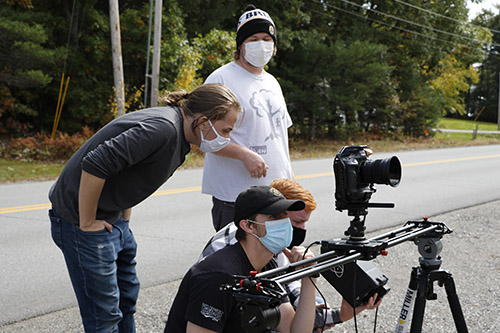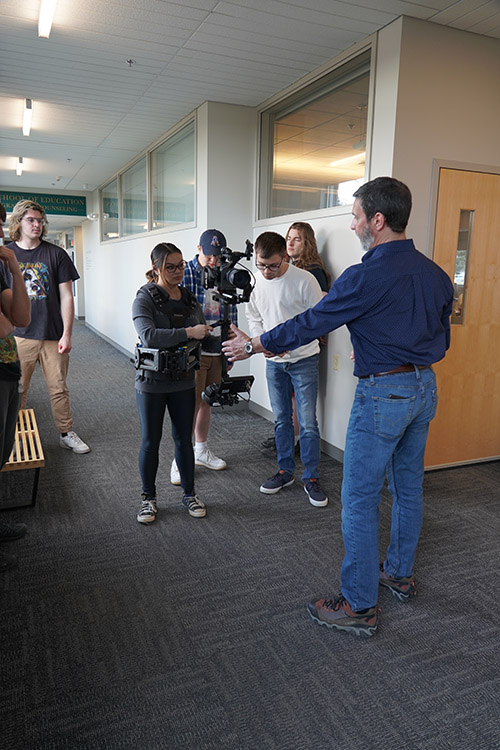
Lights, Camera, Action: How Husson Provides Foundational Filmmaking Skills Useful for Any Career
Published on: March 20, 2023

For the 100+ years that it has existed, the film and video industry has been in a constant state of evolution. From the short, silent films that wowed audiences in cinema's early days to the invention of sound and color to the advances in effects and filmmaking techniques that allow savvy filmmakers to put virtually anything they can imagine on screen, the world of film doesn't stay in place long. Today, it's moving faster than ever, and new technology like high-quality cameras and mobile editing software on smartphones have made it so that anyone with ambition, drive and a few good ideas can make and screen a movie.
That's good because just as there are more people than ever making videos and films, there is more of a demand than ever for original filmed content. Streaming services like Netflix, Hulu and others need shows to fill out their catalogs and attract subscribers. Corporations and nonprofit organizations need convincing and compelling video for advertising, PR and informational purposes. Live performances and sporting events need to be captured on video so fans can watch remotely or later. And of course, social media services like Instagram and TikTok and video platforms like YouTube are essentially powered by the video content made and shared by their millions of users.
Even as technology has made it possible for just about anyone to make a video, there are still some fundamentals needed if you want to make video content that's good quality. Proper lighting techniques, editing, cinematography – these technical skills and others can make the difference between a video looking professional or amateurish.
Fortunately, those skills can be taught, and in fact, are a primary focus at Husson University's New England School of Communications.
Hands-On Filmmaking With the Latest Equipment
 Many popular film programs emphasize theory, film history and high-concept discussions of movies. At the New England School of Communications, though, things are done differently. Theory and history are key parts of the curriculum, but the New England School of Communications' Video/Film Production department puts just as much focus on the actual hands-on work of filmmaking.
Many popular film programs emphasize theory, film history and high-concept discussions of movies. At the New England School of Communications, though, things are done differently. Theory and history are key parts of the curriculum, but the New England School of Communications' Video/Film Production department puts just as much focus on the actual hands-on work of filmmaking.
At Husson, you won't just be sitting in a room watching movies; after all, you can do that on your own time. Instead, you'll have the opportunity to get a camera in your hands and go shoot footage. Then you'll be able to sit down in editing bays and cut that footage together into something truly remarkable.
A major part of the difference comes down to class size. In some other, larger film programs, there are dozens of students per class. However, at Husson, classes are kept relatively small so everyone can get at least a few days per week working with various cameras, mics, and other pieces of equipment in Husson's inventory. And you can be assured the equipment you're using is top of the line and meets industry standards – the New England School of Communications leases equipment (instead of purchasing), meaning every three years or so the equipment is cycled out in favor of the latest and best tools.
You won't only be using that equipment for simple, day-to-day class assignments either. As a New England School of Communications student, you'll be able to put your skills to the test on a variety of projects that reach wide audiences. For example, many Video/Film Production students are tasked with creating content for various nonprofit organizations from around the region; some students have worked on recruitment videos for Maine law enforcement. Students also work on collaborative short film projects. Husson students have put together short film adaptations of Stephen King stories that have earned the praise of the bestselling Maine author himself (and if you know what King thinks of Stanley Kubrick's The Shining, you know he doesn't hesitate to share his feelings when he doesn't like an adaptation of his work). Several years back, Husson students and faculty spent two semesters creating The Tale of Three Brothers, a short film adaptation of a bit of Harry Potter lore that even caught the attention of Warner Bros. Studios, not to mention garnering millions of views on YouTube.
These large-scale projects not only serve to give Husson students a chance to put their technical skills to the test but also provide a taste of the collaborative environment that exists on professional film sets. Whether you're fielding client requests and feedback on a commercial video shoot or working closely with your classmates to light and capture a tricky shot in a short film, the interpersonal skills developed on these projects are invaluable in any professional situation.
And that ultimately is the key. Husson's emphasis on hands-on learning ensures that even as technology and the film industry changes and evolves, you'll have the grounding knowledge to thrive in almost any film or video job. And the truth is, there are many jobs available for people with these skills. That includes jobs you may be thinking of already, like director, cinematographer or editor, but there are many others as well, especially in areas like studio live production. If you watched the Super Bowl in February, you saw the work of a couple of Husson grads who filmed and then processed video for slow-motion playback.
Begin Your Career in Film and Video Production with a Degree from Husson
Video, film, content creation, whatever you want to call it – with an education from Husson's New England School of Communications, you will be ready to thrive regardless of how this industry evolves. We invite you to request info or apply today. After all, with instruction from our expert faculty and the hands-on, experiential learning you'll take part in, you'll develop the skills to not only succeed in building a career in video and film production but also master the techniques that will help you take the field of film into the future.
Back to All Articles